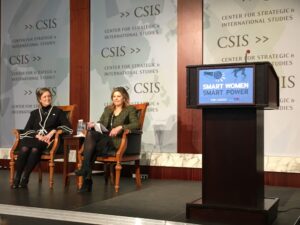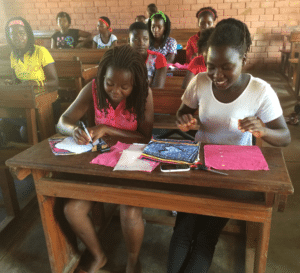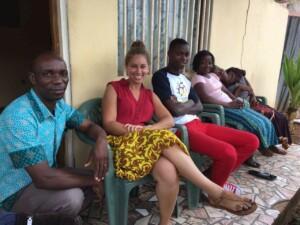Reflections on Smart Women, Smart Power: Women’s Economic Empowerment and the Peace Corps – A Conversation with Dr. Jody Olsen, Peace Corps Director
By Morgan Mickle, Gender Specialist, WI-HER, LLC
Yesterday evening I broke from my regular routine. Instead of going from work to one of my favorite dance classes, I hopped the red line, and headed down to CSIS for an event close to my heart. On the eve of International Women’s Day, I listened to Peace Corps Director Jody Olsen tell a personal story about her journey to Peace Corps and highlight efforts that continue to strengthen women around the globe.

Dr. Olsen opened with reflections of her family. She told us that her grandfather was a four-time Senator who stood by FDR during the signing of key Social Security legislation. Her father was not only a member of Congress, but also a U.S. Ambassador to Madagascar. She had grown up in the shadow of these two great men. Later, as an adult she entered her Peace Corps service in Tunisia as a married Volunteer. She had come to Tunisia with her husband as Mrs. Robert Olsen, accustomed again to her own identity being linked to that of a man’s. But something transformed for Dr. Olsen when she entered the Peace Corps. Peace Corps gave her something different – her own mail, her own projects, and she found she could have her own voice. “We could be equal partners in this experience”, she said.
Dr. Olsen explained that, as a Peace Corps Volunteer, you learn to fit in. You build skills that you take with you the rest of your life. You also gain important talents that aren’t so technical but equally important – to stand quietly, to be present, and to just watch. Yes, when Dr. Olsen was in a different culture with a new language, she found that some values, like the importance of family, were the same as her own. Dr. Olsen’s story painted an all-too-familiar picture; and throughout the whole conversation she had me captivated…because I understood her, she was speaking my language, she was speaking our language, because I too am a former Peace Corps Volunteer, or RPCV. Like so many of us in the room that I imagine were nodding and laughing through her remarks, I sensed a secret bond – a shared feeling and lifelong comradery.
After sharing some of her more intimate life moments, she moved into highlighting some more recent developments in efforts to advance women’s empowerment. The February announcement of the Women’s Global Development and Prosperity Initiative (W-GDP), a whole-of-government approach to promote women’s economic empowerment and gender equality across the globe was one of them. She also shared upcoming opportunities for Peace Corps to make more small project assistance funds available to PCVs so that even more community projects – like the reusable menstrual pad-making workshops Volunteers across Mozambique put on that teach adolescent girls how to make sanitary products that help keep them in school during their periods – are possible.

Closing the conversation, Dr. Olsen answered hand-written questions from the audience that were collected during the session; and there were many. She answered one about how to support boys as they grow up today, speaking about the importance of engaging young men and boys through programs like BRO (Boys Reaching Out). She answered another about the future of Peace Corps, telling the audience about the increasing familial Peace Corps experience when Volunteers over 50 actively involve their children and grandchildren through a variety of technology platforms and the power of exchanging ideas.

Though my question didn’t get answered, I still like to think she’d heard through the excitement in my eyes as I wrote it. But even if she didn’t, it went a little something like this…
Thank you, Dr. Olsen. My name is Morgan Mickle, and I am a Gender Specialist at WI-HER (“Women Influencing Health, Education, and Rule of Law”), a woman-owned small business. I am also a recently Returned Peace Corps Volunteer from Mozambique. At WI-HER, I work to build the capacity of health providers, very similar to the work I did in my rural community – Inharrime. My question is, what are some things we can take from the community to larger organizations to ensure we don’t lose the essence of community empowerment, especially for women and girls? Nibongide (Chopi), Obrigada (Portuguese), and Thank You (English).
I secretly hope I’ll get a message one day with an answer, but for now I’ll imagine Dr. Olsen’s response as something similar to a story she shared and the close of the event about a Volunteer teaching literacy and numeracy classes to women. Though the Volunteer started to waiver on what was the point of teaching numbers, the women knew exactly what they wanted to do – to them, the numbers were a means to learn about cost sheets, profits, and basic addition and subtraction for their businesses. So, the lesson we can bring from communities to larger organizations should be that our solutions must be based locally. This way we can help women and girls help themselves. But in in order to do this, we must listen!
Morgan Mickle served as a Community Health Volunteer in Inharrime, Inhambane, Mozambique from 2016-2018 where she worked to strengthened community programs related to HIV and AIDS, malaria, youth sexual and reproductive health, and maternal child health. At WI-HER, LLC, Morgan leads capacity building, training, and education to strengthen professional-level skills in gender sensitization and integration to position influencers such as health providers to best reach programmatic goals and support high standard lifestyle outcomes in their communities.
WI-HER, LLC (Women Influencing Health, Education and Rule of Law) is a woman-owned small business that partners with international donors, national governments, non-governmental organizations and others to identify and implement creative solutions to complex development challenges to achieve better, healthier lives for women, men, girls, and boys. Founded by Dr. Taroub Harb Faramand in 2011, WI-HER, LLC works to integrate gender through contextualized, adaptable, and systems strengthening methods that can be seamlessly integrated into ongoing and new programs. WI-HER is committed to ensuring equal opportunities for women, men, girls, and boys, as well as all other vulnerable groups, including LGBTQI+ people.